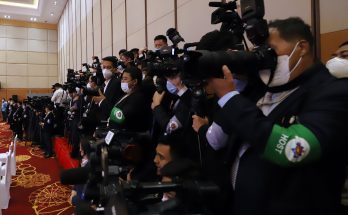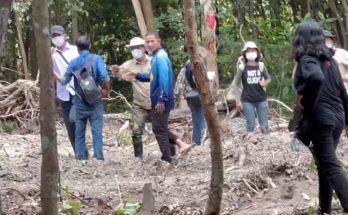During a visit in Washington DC from Nov 26th to Nov 30th, Mr. Pa Nguon Teang, the Director of the Cambodian Center for Independent Media (CCIM), raised the concerns of Cambodian civil society in a forum discussion about the adoption of the ASEAN Human Rights Declaration (AHRD) and met with the offices of U.S Senators R.Durbin (D-IL) and J. Kerry (D-MA) to discuss the state of human rights in Cambodia.
“The decision of ASEAN leader to adopt a flawed declaration is not the right way to guarantee fundamental rights or to promote respect for the rule of law”, said Pa Nguon Teang during his visit to Washington DC. “Rushing through a text while serious concerns about freedom of expression protections and the independence of justice remain unaddressed will create huge problems down the road that won’t be easy to fix.”
The AHRD adopted on November 18th in Phnom Penh by the 10 leaders of the Association of South East Asia Nations (ASEAN) has no intention to protect human rights at a regional level. The declaration, approved in the midst of civil critics, is said to respect international human rights standard but fails to end national law prevalence. Certain provisions appear to grant Member States with the authority and discretion to suspend or withhold the application of any or all of the rights’ in the Declaration on grounds of “national and regional contexts”.
The declaration drafting process has been extremely contentious as no member of civil society has been involved. The language employed is vague and has given rise to fears that the provisions may in fact be utilized to legitimize violations of certain human rights. The final text comes after a paragraph to mention compliance to international human rights standards has been added at the last minute. This decision comes on the heels of Cambodia’s controversial actions to please China throughout its 2012 presidency.
“Cambodia’s failure to win a place on the UN Security Council last month provided a timely reminder that the ASEAN forum is by far and away the country’s best platform through which it can impact upon and influence regional and international affairs” continued Teang. “As a Chair, Cambodia should have promoted human rights. But 2012 was a really bad year for human rights defenders”.
The Cambodian Center for Independent Media has reviewed the final version of the ASEAN Human Rights Declaration (http://www.asean.org/news/asean-statement- communiques/item/asean-human-rights-declaration), and shared its concerns about human rights in Cambodia at the U. Senate, especially about elections, land grabbing and freedom of expression issues.
Key concerns include the following:
POLITICAL AND CIVIL RIGHTS ARE LIMITED
Article 7 mentions that “the realization of human rights must be considered in the regional and national context bearing in mind different political, economic, legal, social, cultural, historical and religious backgrounds.”In this context and with the repressive measures during elections in Cambodia, Mr. Pa Nguon Teang told the US Congress representative that the ASEAN declaration would not be a way for Cambodians to promote their political rights and therefore limits the possibility of free and fair national elections in July 2013.
NATIONAL GOVERNMENTS ARE LEGITIMIZED NOT TO APPLY INTERNATIONAL STANDARDS
While the ADHR recognises the responsibility of corporations to respect human rights and seeks to protect human rights defenders from arbitrary interference with their work, it is also non- binding and no articles provide any kind of enforcement mechanism to hold governments and corporations accountable.
Article 8 states that “The exercise of human rights and fundamental freedoms shall be subject only to such limitations as are determined by law solely for the purpose of securing due recognition for the human rights and fundamental freedoms of others, and to meet the just requirements of national security, public order, public health, public safety, public morality, as well as the general welfare of the peoples in a democratic society.” Such national principles are very vaguely defined and the text legitimizes the fact that Mam Sonando, the owner of the opposition radio Beehive, has been detained for “secession” since July 2012.
INCONSISTENCY WITH ASEAN NON-INTERFERENCE PRINCIPLE
The principle of non-interference is the original core foundation upon which regional relations between ASEAN member-states are based. The non-interference norm should therefore not be regarded merely as an ideal, but also as a political tool. While the principle has in fact never been absolute, this declaration contradicts it by allowing governments to get involved in judicial decision process. No regional structure such as an ASEAN Court of human rights has been put in place to ensure an appeal can be filled at a higher level.
Click HERE to download PDF file.


